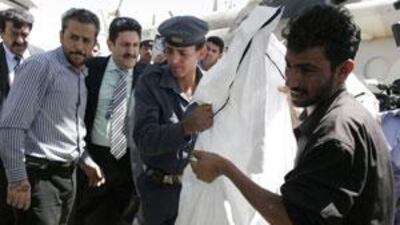BERLIN // The two daughters of the German family kidnapped in Yemen nearly a year ago and rescued by Saudi forces on Monday now speak virtually only Arabic, their uncle said, indicating they have been separated from their parents for months.
Lydia and Anna Hentschel, who are six and four, were flown back to Germany in a military plane on Wednesday after being freed in a Saudi operation in the border region between Yemen and Saudi Arabia. The fate of their parents, Johannes and Sabine Hentschel, remains unknown. The devout Christians had worked in a Protestant-run hospital in Sa'ada in the north-west of the country since 2003. Their son, Simon, who would be less than two years old, is believed to have died, said their uncle, Reinhard Pötschke, a priest. He said that only Lydia still speaks a little German.
The family was seized by gunmen on June 12 while on an excursion with two female German Bible students, a British engineer and a female South Korean teacher. The two students and the teacher were found three days later, executed with shots to the head. The fate of the engineer is unknown. Lydia and Anna, wearing jeans and pink pullovers and clutching toys, were with a relative, a doctor and a psychologist on their flight to Dresden after undergoing medical tests in Saudi Arabia. "They are in good condition, considering the circumstances," said a spokesman for the German foreign ministry.
Neither looked sunburned or malnourished but their relatives in Germany said they still hardly recognised them. "You can tell that they haven't been on a holiday," Mr Pötschke said. "No one can imagine what they went through." They girls are being cared for by family members and shielded from the press. Unconfirmed German media reports said the girls appeared to have been looked after by an Arab family, which would explain why they speak Arabic. Their lack of German suggests they have not had contact with their parents for a long time.
The brutality and length of this hostage drama may be explained by media reports that Mr Hentschel had been trying to convert Muslims to the Christian faith. Der Spiegel, a leading German news magazine, reported that Johannes Hentschel had been threatened after he spoke to a Muslim man about religion in a teahouse in Sa'ada. In a letter sent to friends in Germany, Mr Hentschel had said: "I encouraged him to read the Bible," Der Spiegel reported.
The man's brother later approached Mr Hentschel in the hospital where he worked and had threatened to complain to religious authorities about him. Mr Hentschel appears to have paid little attention to the warning. "Pray for his faith," he said in his letter, "and that he comes to the faith and accepts Jesus as his lord." German authorities believe that the Germans in Sa'ada were regarded as Christian missionaries. Missionary writings were found in the belongings of the Bible students who were shot dead.
Johannes, a technician who spoke Arabic, and Sabine, a nurse, had fulfilled a dream by uprooting themselves from their home in Meschwitz in eastern Germany seven years ago and moving to Yemen. They were employed by Worldwide Services, a Christian charity based in the Netherlands. They had planned to return to Germany this year for their daughters to start school. In Germany, deep concern for the family has been mixed with criticism of the parents' decision to live with young children in a particularly unstable region of Yemen, which has been the scene of a long-standing conflict between government forces and Zaidi Shiite rebels.
There are conflicting reports about how the hostages were released, but officials said no shots were fired. It is likely to remain unknown whether a ransom was paid for the two young girls. Yemeni government sources said up to US$5 million (Dh18.4m) was paid for the two German girls this week. The Saudi interior ministry, however, said the girls were freed in a cross-border military operation. In recent years, the seizure of German hostages in Third World countries has usually been resolved peacefully through hefty ransom payments handed over by the German government.
In 2006, two German engineers were freed by their kidnappers in Iraq amid widespread speculation that a ransom had been paid. In 2005, the government confirmed that money had changed hands to secure the release of Susanne Osthoff, a German woman living in Iraq. In 2003, media reports said at least ?5 million (Dh22.6m) changed hands for Berlin to secure the release of 14 adventure tourists kidnapped while vacationing in the Sahara Desert.
@Email:foreign.desk@thenational.ae

